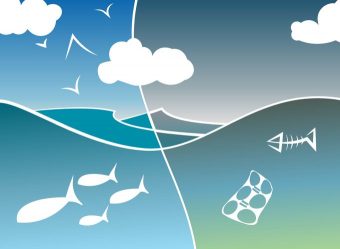
The first phase of the UK ban on plastic microbeads will come into effect today, as the government moves to strengthen its crack down on marine plastic pollution.
The ban on the manufacture of microbeads in ‘rinse-off’ products comes into force today, with a further ban on selling products that contain microbeads due in six months time.
Environment Minister Therese Coffey heralded the ban as a “world-leading” move and an “important milestone” in the battle to reduce the amount of plastic entering our oceans.
“Microbeads are entirely unnecesary when there are so many natural alternatives available,” she said. “The world’s seas and oceans are some of our most valuable natural assets and I am determined we act now to tackle the plastic that devastates our previous marine life.”
Her comments came just days after Prime Minister Theresa May promised more action on tackling marine plastic pollution would be forthcoming from the government. “We want to do the same in relation to single-use plastic,” she told the BBC’s Andrew Marr. “Nobody who watched Blue Planet will doubt the need for us to do something.”
The Environmental Audit Committee said the ban was “a step in the right direction” but warned “much more needs to be achieved” to tackle the scourge of marine plastic pollution.
“Our seas are choked with massive quantities of polluting microplastics, which absorb chemicals, are eaten by wildlife and enter the food chain”, said Committee chair Mary Creagh.
“My committee has also recommended a deposit return scheme for plastic bottles, a latte levy for plastic-lined coffee cups and reforms to make producers responsible for their packaging.”
Her comments were echoed by WWF Head of Marine Policy, Dr Lyndsey Dodds, who said “any step to tackle the plastic problem is welcome, but to save our oceans will require ambitious action”.
Greenpeace Oceans Campaigner Tisha Brown also acknowledged the ban is a “positive first step”, but that “more work needs to be done.”
“There’s already some early stage work to look at extending the ban”, she said. “We hope that this will happen within the next couple of years, or even next year as the government seems very serious about this.”
Businesses still stocking products containing microbeads after the ban comes into force may face fines and possible legal action, Defra warned.
A guidance document has been provided to alert companies to potentially non-compliant products. Specially trained officers will also be checking goods at UK Borders to ensure they comply with the ban. A £100,000 fund for legal aid and court costs has been provided for the Ministry of Justice.
It is unclear whether the ban will extend to imports of products containing microplastics in the coming six months. Just over half of all products in the UK cosmetics market are imported, according to the CTPA or UK Cosmetic Trade Association.
The ban will not affect ‘leave on’ products such as make-up and sunscreen. The cosmetics industry said that such a change would force them to reformulate up to 90 per cent of their products.
Microbeads are tiny bits of plastic – typically formed from polyethylene, polypropylene and polymethylmethacrylate – that are too small for many sewage systems to filter them out. They are known to be accumulating in the ocean’s, causing serious damage to wildlife and entering the food chain, as shown in the recent BBC series Blue Planet II.
Many cosmetics companies have already stopped using microbeads. The Body Shop stopped using them in 2015 while Clearasil and Neutrogena products aimed to phase them out by the end of 2017.
However, green groups remain concerned that many non ‘rinse-off’ cosmetic products and textiles continue to contain microbeads and threads that are polluting marine environments.
Source: businessgreen.com

